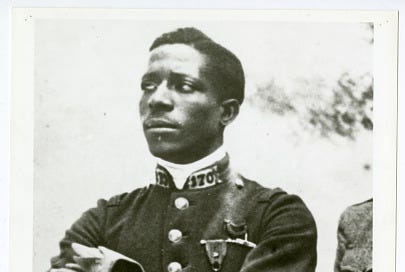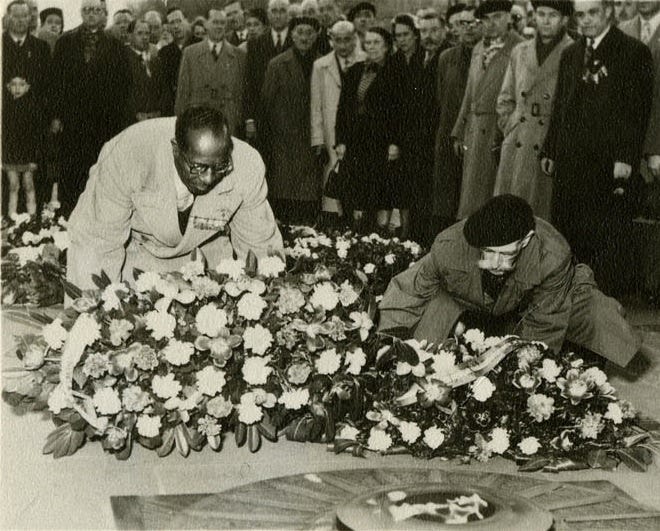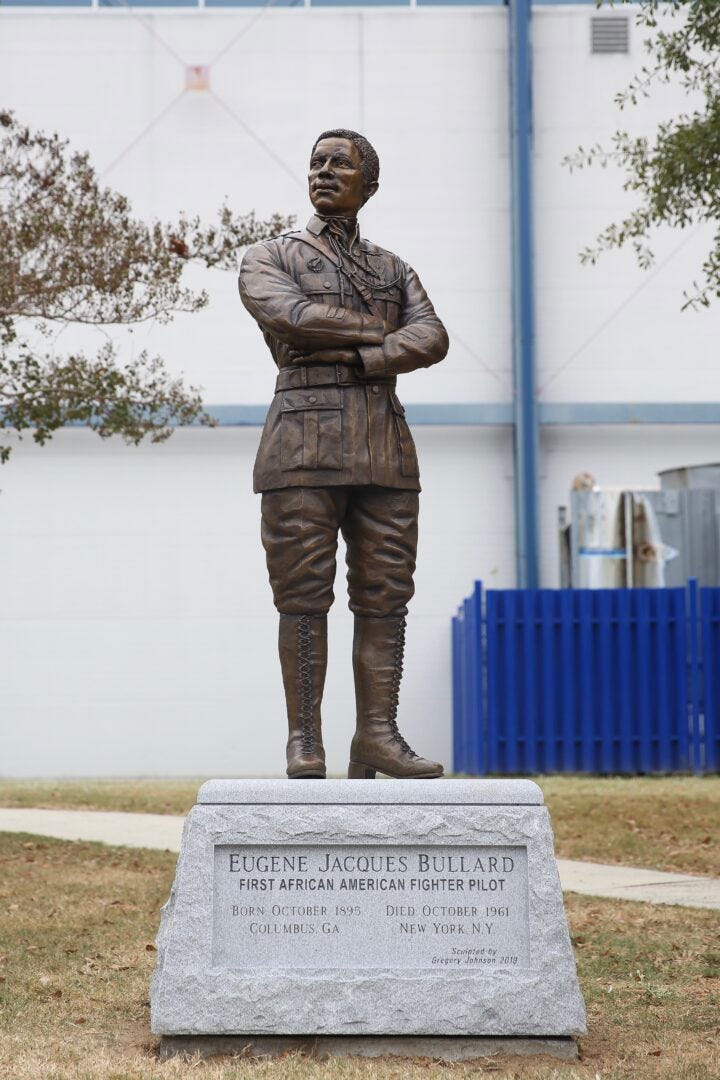The Black Swallow of France: A Hero America Refused
The Untold Legacy of Eugene Bullard, the World's First Black Combat Pilot
“He flew before he was seen. He bled before he was believed. Eugene Bullard was history’s proof before it was ready to listen.”
Before Tuskegee Airmen made headlines, before America claimed the skies as a space of integration, one man had already charted the course.
Eugene Bullard, the world’s first Black combat pilot, fought for a country that wasn't his and was ignored by the one that was. His legacy isn't just forgotten history; it's a mirror held up to what we choose to remember, and why.
Eugene Jacques Bullard’s life defies gravity, soaring above the weight of American racism with courage, grit, and an almost mythic sense of purpose. Born into the harsh realities of the segregated American South, Bullard would go on to become the world’s first African-American military combat pilot, though not for his own country. Instead, he flew for France during World War I, his aircraft emblazoned with the powerful words, “All Blood Runs Red.” His story, long overlooked in American history, is a testament to the strength of the human spirit and the enduring fight for dignity and recognition.
He fought for freedom on foreign soil, only to be denied dignity on his own. Eugene Bullard, combat pilot, war hero, human target lived a life that reads like legend and indicts like history. Born into the unforgiving grip of the Jim Crow South, Bullard escaped not just a place, but a system that insisted he was invisible. What followed was an odyssey—across continents, wars, and ideologies fueled by a relentless need to prove his worth in a world determined to overlook him. France would honor him. The United States would forget.
Until forgetting was no longer an option.
Bullard was born in 1895 in Columbus, Georgia, a place steeped in the brutal legacy of Jim Crow laws. As a young boy, he witnessed firsthand the cruelty of racism and violence. By 11, Bullard had already seen enough. He slipped away from the Jim Crow South not with a plan, but with a conviction: somewhere out there, skin color wouldn’t be a sentence—it might even be invisible.
His journey took him across the American South and eventually across the Atlantic. He traveled with a group of Romani people, worked odd jobs, and by age 16, had stowed away on a ship bound for Scotland. From there, he made his way to England, surviving by taking whatever work he could find—street performer, dock worker, fish wagon helper, even a human target in an amusement park. Eventually, he found his way to France, a country that would become his true home. France didn’t just welcome Bullard—it redeemed him. In its streets, he was a man before he was a color. In its army, he wasn’t a symbol—he was a soldier.
When Europe ignited in 1914, Bullard enlisted in the French Foreign Legion, not out of glory, but out of conviction. In the mud-caked trenches of Champagne and the blood-soaked ground at Verdun, he became something more than a survivor. Bullard fought in one of the war’s most grueling battles—the Battle of Verdun. Even after suffering a serious head injury, he refused to leave the front lines. His courage and determination were undeniable.
He became The Black Swallow—a man unafraid to fly into the storm while others sought shelter.
In 1917, Bullard made history. He was accepted into the Lafayette Escadrille, a French Air Force unit composed largely of American volunteers. There, he became the first African-American combat pilot, flying between 25 and 27 missions.
His plane bore the motto “Tout sang qui coule est rouge”—“All blood runs red”—a powerful reminder of the shared humanity beneath our skin.
He shot down two German planes and survived being shot down himself, his aircraft riddled with nearly 100 bullet holes. His fellow soldiers pulled him from the wreckage, and he returned to fight again.
When the U.S. entered the war, Bullard applied to join its Air Service. Of the 29 American pilots flying for France who submitted applications, he was the only one turned away. The official excuse? He wasn’t an officer. The unspoken truth? He was Black. The nation that celebrated democracy abroad still refused to acknowledge dignity at home. This rejection was a bitter reminder that, despite his heroism, Bullard was still seen as unequal in the eyes of his homeland.
Bullard remained in France after the war, where he found success and respect. But as World War II loomed, he once again answered the call to serve. He worked as a spy, gathering intelligence on Nazi sympathizers in Paris. When war broke out, he joined the 51st Infantry Regiment as a machine gunner and was seriously wounded by an artillery shell no longer able to serve and fearing capture by the Nazis, Bullard fled France, making his way through Spain and Portugal before returning to the United States.
He returned to New York after 28 years, not as a decorated hero, but as a Black man in America—greeted not with honor, but with indifference. White veterans were handed stipends and hotel keys. Bullard, the only Black veteran aboard, received silence. He settled in Harlem, working various jobs and raising his daughters. Despite his heroism, he lived in relative obscurity.
France never forgot Bullard. In 1954, he was one of three men chosen to relight the eternal flame at the Tomb of the Unknown Soldier in Paris. In 1959, he was awarded the Legion of Honor, France’s highest military decoration.
It wasn’t until decades later that the United States began to acknowledge his legacy. In 1994, Bullard was posthumously commissioned as a second lieutenant in the U.S. Air Force. Today, a display at the National Museum of the U.S. Air Force in Dayton, Ohio, honors his life and service.
Major Accomplishments
First African-American military combat pilot in history.
Flew 25–27 combat missions for France during World War I.
Shot down two German aircraft during aerial combat.
Awarded the Croix de Guerre and other French military honors for bravery.
Served as a spy against Nazi sympathizers in France before World War II.
Wounded in action while serving in the French Army during both World Wars.
Knighted with the Legion of Honor by France in 1959.
One of three men chosen to relight the eternal flame at the Tomb of the Unknown Soldier in Paris in 1954.
Posthumously commissioned as a second lieutenant in the U.S. Air Force in 1994.
Honored with a permanent display at the National Museum of the U.S. Air Force in Dayton, Ohio.
Bullard’s life is a ledger of contradiction: valor without validation, patriotism without welcome. He reminds us that some heroes are remembered not when they should be, but when we’re finally ready to see them.
On Oct. 13, 1961, Eugene Bullard died and was buried with full military honors in his legionnaire’s uniform in the cemetery of the Federation of French War Veterans in Flushing, N.Y. On Sept. 14, 1994, the Secretary of the Air Force posthumously appointed him a second lieutenant in the United States Air Force.
So what do we do with a story like Eugene Bullard’s? We tell it. In classrooms and museums, in protests and podcasts. We write his name beside the ones we already know, not beneath them. We challenge the silence that let him vanish, and we question the structures that still decide whose courage gets canonized and whose gets footnoted.
Because remembrance isn’t passive. It’s a choice. And justice—delayed, denied, or discolored—is only corrected when enough of us insist that the record speak truth.
“Valor knows no color—but history pretends it does.”
Tell his story. Say his name. Then ask: who else have we forgotten?
Cites for this Article:
AOPA. (2022, February 24). Eugene Bullard: First African American military pilot flew for France. Aircraft Owners and Pilots Association. https://www.aopa.org/news-and-media/all-news/2022/february/24/eugene-bullard-first-african-american-military-pilot-flew-for-france
Lloyd, Craig. "Eugene Bullard." New Georgia Encyclopedia, last modified Jul 17, 2020. https://www.georgiaencyclopedia.org/articles/history-archaeology/eugene-bullard-1895-1961/
PBS. The two lives of Eugene Bullard. American Experience. https://www.pbs.org/wgbh/americanexperience/features/great-war-two-lives-eugene-bullard/
Wikipedia contributors. (2023, November 5). Eugene Bullard. Wikipedia. https://en.wikipedia.org/wiki/Eugene_Bullard
CellyBlue-I Do Know This!
Support CellyBlue ❤️ at Kofi










Thank you for telling us about this amazing man.
An extraordinary man with an extraordinary story. Beautifully written. I’m both surprised and sadly unsurprised that he hasn’t been more widely celebrated at least in a movie. Will you write a book about him? There must be so many details that would interest a wide audience.